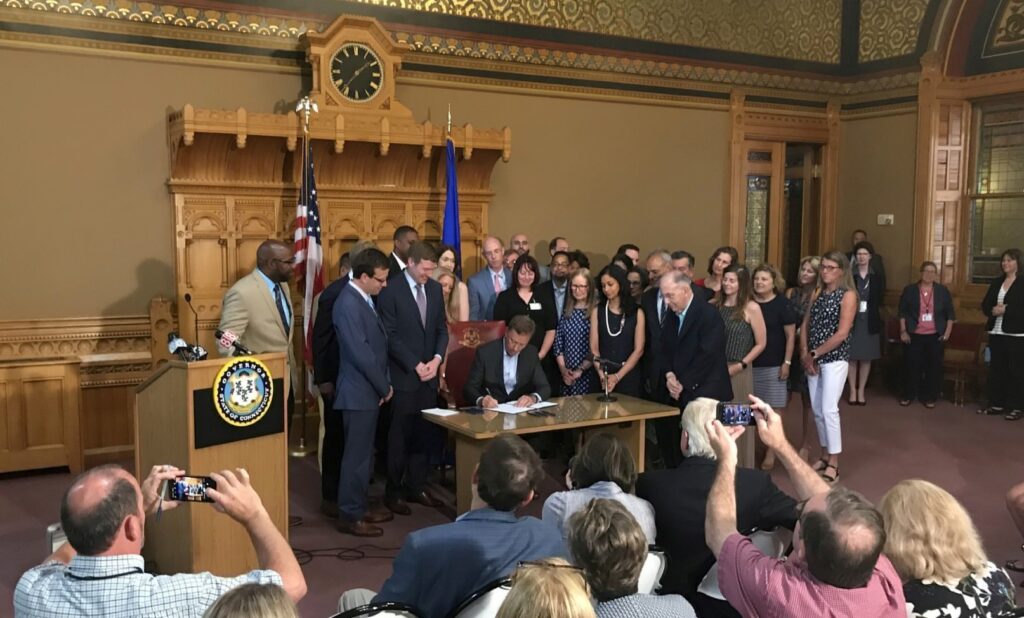

MHC’s 2023 Legislative Priorities
2023 Legislative Session: January 4 – June 7
Public Policy Contact:
Mike Finley, Public Policy Coordinator
mfinley@mhconn.org 860.218.4056
Learn more about MHC and our Year in Review for 2022: 
OUR VISION AND MISSION:
Mental Health Connecticut (MHC) envisions a future where wellbeing is rooted in respect for the condition of being human.
We get closer to realizing this future vision each day by partnering with individuals, families, and communities to create environments that support long-term health and wellness.
Mental Health Connecticut (MHC) was founded by Clifford W. Beers, the “grandfather of recovery,” in 1908. We began as an advocacy organization fighting for the fair treatment of all Connecticut residents. We believe everyone has the right to choose their path to wellness. Our approach to care is recovery-oriented, person-centered, and evidence-based.
Behavioral Health Is the Priority in 2023

MHC supports legislation that increases access to care, challenges stigma and discrimination, encourages preventative care, and elevates mental wellness to the same level of priority as physical wellness.
Connecticut residents are paying attention to their mental health and are seeking the commitment of the CT Legislature to commit to long-term policy initiatives. The CT Legislature has the opportunity to create a vision for the behavioral health system across the life span, and to fund areas that allow for:
PREVENTION AND INTERVENTION: When mental health and substance use conditions are addressed through prevention and intervention, especially for youth and young adults, it will allow Connecticut to:
- increase early detection, save lives, and improve long-term health outcomes

- lower health care costs
- remove barriers that cause stigma and discrimination
- apply whole health approaches, from nutrition to collaborative care
- invest in peer support, community health care workers, and other models that increase access
MHC is aligned with our national affiliate organization, Mental Health America (MHA), in the #B4Stage4 philosophy which advocates for mental health literacy and preventative measures.
EQUITY: It’s time to address health equity and make structural decisions based on the Social Determinants of Health. This requires Connecticut to work across systems, implement data-driven policy, identify where behavioral health outcomes intersect with oppression and racism, improve the quality of life for frontline workers, set up the human services sector for long-term success, and expand the delivery system in community-based care.
FINISHING WHAT WE STARTED: There is common ground understanding that all environments, from schools to workplaces to communities and homes, will improve if emotional and psychological safety mirror physical safety.
The following areas are basic concepts that have deep bi-partisan support but have been stuck in policy limbo for far too long. In 2023, we are calling for the following to forward:
- Enforce private health insurance parity for Mental Health and Substance Use. After the passage of the CT Parity law (ctparitycoalition.org) in 2019, and 15 years after the federal law, compliance is still unknown and unconfirmed in many cases, yet consumer experiences of inequity in health care are prevalent and increasing. We ask that the legislature hold the private health insurance industry accountable by addressing their lack of compliance with existing laws in 2023. The citizens of Connecticut need CT’s legislature to shore up the 2019 bill and strategize for future compliance and enforcement – as Connecticut is falling behind many states in the country – including our neighbors, Massachusetts.
- Ensure peer support is an essential part of Connecticut’s mental health workforce. Peer support is an evidence-based practice of incorporating certified individuals with lived experience into clinical and non-clinical settings to support individuals on their path to recovery. In 2021, MHC supported the creation of a task force (which, to date, has not convened) to study reimbursement models. Creating a system that elevates the peer support workforce is essential to all future growth in this area, especially peer-run respites with trained Recovery Support Specialists. MHC is working with a diverse group of coalition members on educating lawmakers on the importance of peer support and how it can transform and elevate the level of care for individuals in CT.
MHC is also advocating for the following:
- Ensuring long-term funding for the 988 Crisis Response System. Connecticut’s ability to support a system for responding to a mental health crisis through 988 must have long-term funding allocated so residents are supported by someone trained in experiencing mental health and substance use situations, and includes staff who are certified in peer support.
- Codifying telehealth as a permanent part of health care delivery. For individuals and families in rural areas, as well as elderly populations and individuals living with disabilities and receiving in-home care, telehealth has become essential.
- Supportive Housing and Housing First. Supporting Housing First policies that expedite access to permanent supportive housing for people with mental health and substance use conditions and integrate mental health and substance use treatment with an effective safety net that includes safe and affordable housing, without requiring treatment as a precondition.

